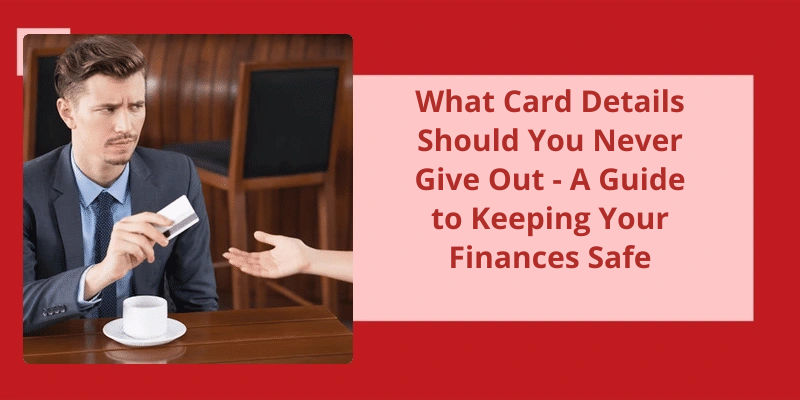When it comes to safeguarding your finances, it's crucial to be mindful of the information you share with others. In this digital age, we're constantly bombarded with messages requesting us to provide our personal information for various reasons. However, it's essential to exercise caution and only disclose information that’s absolutely necessary. One such aspect of financial information that you should never share with anyone is your credit card details. This includes your PINs, interest banking passwords, or mobile banking passwords. Even if you receive a message or an email requesting this information, it's vital to avoid sharing it. It's important to note that no legitimate bank or financial institution would require you to provide these details in such a manner. Therefore, it's crucial to always be on high alert and prioritize your financial security by keeping your card details confidential.
What Bank Card Details Are Safe to Share?
When it comes to sharing bank card details, it’s important to exercise caution. The safety and security of your personal finances depend on it. There are certain card details that are safe to share, such as the name of the cardholder. This information is already known to most people, and it isn’t considered sensitive data. However, you should avoid sharing information such as your card number and expiry date. This information is printed on the card for your convenience, not for others.
It’s also important to be mindful of who’s asking for your bank card details. Scammers and fraudsters often pose as legitimate businesses or organizations to trick people into giving away their sensitive information.
In addition to being cautious when sharing bank card details, it’s important to monitor your account regularly for any signs of fraudulent activity. This includes checking your account balance, reviewing transaction history, and reporting any suspicious activity to your bank or credit card issuer.
By following the tips outlined above and staying informed about the latest security threats, you can help ensure that your personal finances remain secure.
How to Spot and Avoid Bank Card Fraud
Bank card fraud happens when someone uses your credit or debit card information to make unauthorized purchases or withdrawals. To avoid becoming a victim, you need to be aware of common scams and fraud tactics, carefully review your bank and credit card statements regularly, and monitor your accounts for any suspicious activity. Additionally, you should protect your personal and financial information, such as login credentials and card numbers, by keeping them secret. If you do notice any fraudulent activity, report it to your bank or credit card company immediately.
It’s important to exercise caution when giving out your card details over the phone. Scammers and fraudsters can use this information to make unauthorized purchases or commit identity theft. In this article, we’ll explore best practices for protecting your card details during phone transactions.
What Card Details Should I Give Over the Phone?
The security of your card details is of utmost importance when divulging information over the phone. Therefore, it’s crucial to ensure that you’re speaking with a trustworthy and reputable vendor before giving your card details over the phone. Obtaining this information can be as simple as checking the companys website for their contact details and verifying their legitimacy through online reviews and ratings.
Make the necessary arrangements to ensure that no other party is within earshot of your conversation, and refrain from using public or unsecured Wi-Fi Connections. Additionally, be cautious of unsolicited calls requesting for your card details, as this is a common tactic used by fraudsters to acquire sensitive information.
It’s also pertinent to be wary of the information youre providing and to withhold any unnecessary details. Only provide the necessary information that’s required to complete the transaction, and avoid volunteering any additional information such as your social security number, home address, or email address, among others.
When making transactions over the phone, you should also be vigilant of any additional charges that may be incurred without your consent. Before authorizing any payment, thoroughly scrutinize the transaction details including the amount charged, currency, and date, among others. If you observe any inconsistencies, raise the issue with the vendor for clarification or withhold payment until the issue is resolved.
Make sure to verify that youre dealing with a trustworthy vendor, scrutinize all transaction details before authorizing payment, and remain vigilant by monitoring your bank statements regularly. By adopting these measures, you can ensure that your card details remain secure and that your transactions are protected from potential fraudulent activities.
How to Protect Yourself From Phone Scams and Phishing Attempts
- Don’t give out personal information to anyone over the phone or via email.
- Be suspicious of unsolicited phone calls or emails, especially if they claim to be from a government agency or financial institution.
- Don’t click on links or download attachments in suspicious emails.
- If you receive a suspicious phone call, hang up and call the company or agency directly to verify the legitimacy of the request.
- Use strong and unique passwords for all accounts and change them regularly.
- Enable two-factor authentication on all accounts that offer it.
- Update software on all devices to protect against known vulnerabilities.
- Don’t use public Wi-Fi networks for sensitive transactions or activities.
- Use a reputable antivirus software and keep it up to date.
- Stay informed about the latest scams and tactics used by scammers.
Conclusion
In conclusion, safeguarding our personal and financial information is crucial in the digital age we live in. While sharing our credit card details, we must exercise caution and avoid sharing sensitive information like PIN, passwords, or mobile banking details with anyone. We should also be wary of any suspicious emails or messages requesting such details, as they might be a phishing attempt. In the end, it's our responsibility to protect ourselves and our finances by being vigilant and cautious with our card details. A little caution can go a long way in ensuring our financial security.






